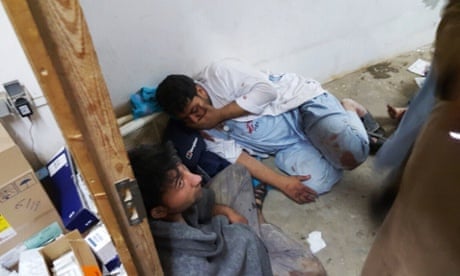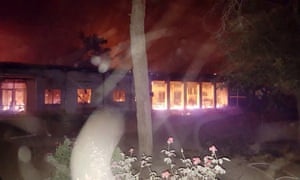
Nine staff dead and up to 37 injured in Médecins Sans Frontières hospital as charity says bombing continued for 30 minutes after it raised alarm
A US airstrike appears to have hit a hospital run by Médecins Sans Frontières (Doctors Without Borders) in the Afghan city of Kunduz, killing nine staff members and injuring up to 37 people.
A US airstrike appears to have hit a hospital run by Médecins Sans Frontières (Doctors Without Borders) in the Afghan city of Kunduz, killing nine staff members and injuring up to 37 people.
Live MSF staff killed in suspected US strike on Kunduz hospital in Afghanistan - latest
Médecins Sans Frontières says another 30 workers are missing after bombs fell on a medical facility in Kunduz. Follow the latest developments.
The charity claimed it had circulated the coordinates of the site to all sides engaged in fighting in the country, adding that the bombing continued for 30 minutes after it had raised the alarm with Afghan and US authorities.
At the time of the bombing, 105 patients and their carers, and more than 80 MSF international and national staff were in the hospital, the charity said.
Some members of staff were still unaccounted for on Saturday and there are fears the death toll will rise considerably. Up to 10 international aid workers who were based in the hospital are believed to have survived the attack.
“We are deeply shocked by the attack, the killing of our staff and patients and the heavy toll it has inflicted on healthcare in Kunduz,” Bart Janssens, MSF’s director of operations, said.
“We do not yet have the final casualty figures, but our medical team are providing first aid and treating the injured patients and MSF personnel and accounting for the deceased. We urge all parties to respect the safety of health facilities and staff.”
He said the hospital was well known: “It was the only functional hospital in Kunduz since the fighting had begun and we have shared extensively the locations of this hospital with all warring parties in Afghanistan.”
The charity later added: “The bombing continued for more than 30 minutes after American and Afghan military officials in Kabul and Washington were first informed. MSF urgently seeks clarity on exactly what took place and how this terrible event could have happened.”
A spokesman for the US military admitted it might be responsible.
“US forces conducted an airstrike in Kunduz city at 2:15am (local), 3 October, against individuals threatening the force. The strike may have resulted in collateral damage to a nearby medical facility. This incident is under investigation,” said Colonel Brian Tribus, spokesman for international forces in Afghanistan.
The bombardment apparently followed heavy fighting around the hospital. An MSF staff member, who was on duty at the time, told the Guardian: “I was inside my office. Around 2am, the plane started bombing the main building of MSF. It lasted one and a half hours. After 3.30am, I came out from my office and saw all of the hospital was on fire,” the staff member said.
“We couldn’t save our doctors, our nurses, our cleaners, our friends. They burned inside the hospital. We couldn’t save our brothers and friends,” the staff member said, asking to remain anonymous.
Médecins Sans Frontières says another 30 workers are missing after bombs fell on a medical facility in Kunduz. Follow the latest developments.
The charity claimed it had circulated the coordinates of the site to all sides engaged in fighting in the country, adding that the bombing continued for 30 minutes after it had raised the alarm with Afghan and US authorities.
At the time of the bombing, 105 patients and their carers, and more than 80 MSF international and national staff were in the hospital, the charity said.
Some members of staff were still unaccounted for on Saturday and there are fears the death toll will rise considerably. Up to 10 international aid workers who were based in the hospital are believed to have survived the attack.
“We are deeply shocked by the attack, the killing of our staff and patients and the heavy toll it has inflicted on healthcare in Kunduz,” Bart Janssens, MSF’s director of operations, said.
“We do not yet have the final casualty figures, but our medical team are providing first aid and treating the injured patients and MSF personnel and accounting for the deceased. We urge all parties to respect the safety of health facilities and staff.”
He said the hospital was well known: “It was the only functional hospital in Kunduz since the fighting had begun and we have shared extensively the locations of this hospital with all warring parties in Afghanistan.”
The charity later added: “The bombing continued for more than 30 minutes after American and Afghan military officials in Kabul and Washington were first informed. MSF urgently seeks clarity on exactly what took place and how this terrible event could have happened.”
A spokesman for the US military admitted it might be responsible.
“US forces conducted an airstrike in Kunduz city at 2:15am (local), 3 October, against individuals threatening the force. The strike may have resulted in collateral damage to a nearby medical facility. This incident is under investigation,” said Colonel Brian Tribus, spokesman for international forces in Afghanistan.
The bombardment apparently followed heavy fighting around the hospital. An MSF staff member, who was on duty at the time, told the Guardian: “I was inside my office. Around 2am, the plane started bombing the main building of MSF. It lasted one and a half hours. After 3.30am, I came out from my office and saw all of the hospital was on fire,” the staff member said.
“We couldn’t save our doctors, our nurses, our cleaners, our friends. They burned inside the hospital. We couldn’t save our brothers and friends,” the staff member said, asking to remain anonymous.

Facebook Twitter Pinterest Fires burn in part of the MSF hospital hit by an airstrike. Photograph: MSF/AFP/Getty Images
Adil Akbar, a doctor at the trauma centre who was on duty at the time, told the Associated Press the operating theatre, emergency room and other parts of the hospital complex had been hit.
“I managed to escape after the attack but I know that most of the staff and even some of the patients are missing,” he said.
The death toll was likely to rise, as MSF gained a clearer view of the damage.
One Kunduz resident told the Guardian that he knew four doctors who had been killed.
The Guardian view on the fall of Kunduz: the high price of international neglect
Editorial: The Taliban recapture of an important northern Afghan town is a major setback for the Kabul government and for western strategies alike.
The Afghan government claimed on Thursday that it had regained control of Kunduz after the Taliban seized the key city in northern Afghanistan on Monday. However, fighting has since continued in pockets around the city, and in surrounding districts, with both sides claiming to be in control.
The capture of Kunduz marks the first time since 2001 that the Taliban have breached an urban area.
Afghan special forces have been battling to retake the city with the help of international special forces advising on the ground, as well as US airstrikes.
Since fighting broke out on Monday, MSF had treated 394 wounded people in Kunduz.
It is the second time in a few months the safety of MSF staff in Kunduz has been threatened. In July, the hospital closed down temporarily after armed members of the Afghan security forces assaulted three staff members and entered the hospital in search of insurgents.
MSF has worked in Afghanistan since 1980, and the hospital in Kunduz is their only facility in north-east Afghanistan.




No comments:
Post a Comment